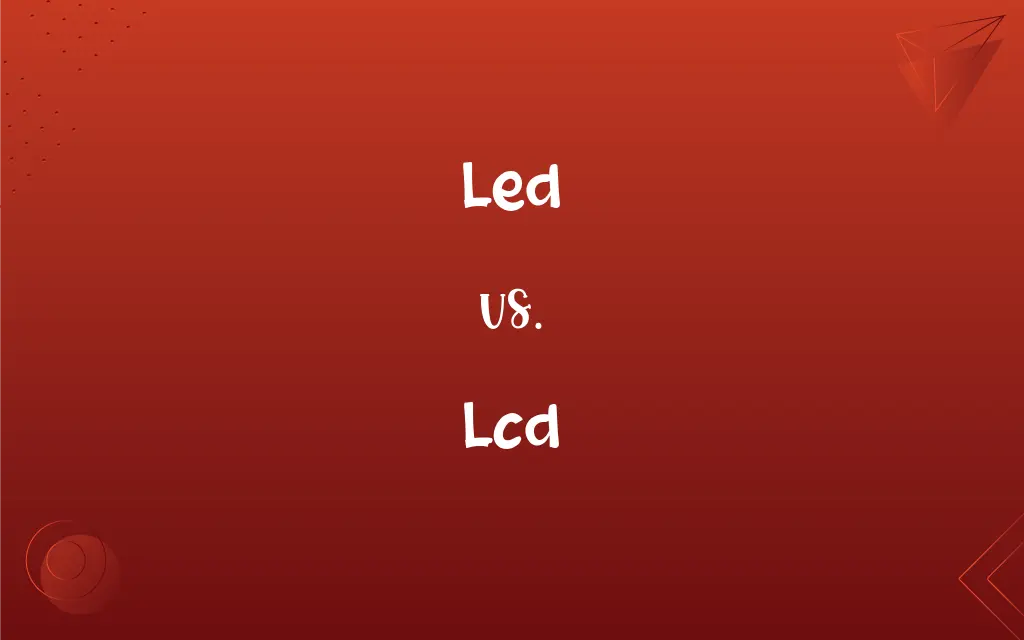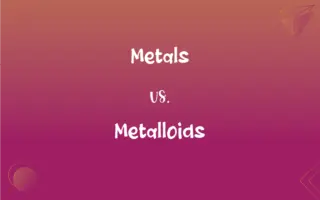LED vs. LCD: What's the Difference?
Edited by Aimie Carlson || By Harlon Moss || Updated on October 20, 2023
LED stands for "Light Emitting Diode," while LCD means "Liquid Crystal Display." Both are screen technologies, but LED uses diodes that emit light, whereas LCD uses liquid crystals to modulate light.

Key Differences
LED stands for "Light Emitting Diode." It's a semiconductor device that emits light when an electric current passes through it. On the other hand, LCD stands for "Liquid Crystal Display." It utilizes a liquid crystal solution sandwiched between two layers of polarized glass.
An LED display creates light directly using tiny diodes. In contrast, an LCD display doesn’t produce its own light. Instead, it relies on an external light source, like a backlight, to produce images.
LEDs generally offer better brightness and color contrast than LCDs. However, LCDs can sometimes offer better viewing angles, making them preferable in certain situations where wide-angle viewing is essential.
Power consumption is another differentiating factor. LED screens usually consume less power than LCD screens, making them more energy-efficient. LCD screens, especially those with fluorescent backlights, can consume more power.
Both LED and LCD technologies have their advantages and disadvantages. While LED is often praised for its energy efficiency and vibrant colors, LCD can be more cost-effective and offer certain display benefits like better viewing angles.
ADVERTISEMENT
Comparison Chart
Acronym Meaning
Light Emitting Diode
Liquid Crystal Display
Light Source
Emits its own light
Requires external light source
Power Consumption
Generally lower
Higher than LED
Color and Brightness
Brighter and more vibrant
Can have more diffused brightness
Cost
Can be more expensive
Generally more cost-effective
ADVERTISEMENT
LED and LCD Definitions
Led
Indicates past leadership or guidance.
She led the team to victory last season.
Lcd
Stands for Lowest Common Denominator in mathematics.
To add the fractions, find the LCD first.
Led
A semiconductor light source.
The new flashlight uses an LED for brighter illumination.
Lcd
Utilizes electric currents to align liquid crystals.
The LCD screen changes when you adjust the contrast.
Led
Represents a leading or primary position.
He led the parade down Main Street.
Lcd
A screen technology using liquid crystals.
The old monitor in the office uses an LCD screen.
Led
A display technology using light-emitting diodes.
My new TV has an LED screen.
Lcd
A display that needs a backlight for visibility.
The LCD on my watch is hard to read in the dark.
Led
Refers to introducing or setting in motion.
She led the discussion on climate change.
Lcd
Offers wider viewing angles than some other technologies.
The LCD TV in the lobby can be viewed from various angles.
Led
A semiconductor diode that converts applied voltage to light and is used in lamps and digital displays.
Lcd
A digital display that uses liquid crystal cells that change reflectivity in an applied electric field; used for portable computer displays and watches etc.
FAQs
Can LED screens be used outdoors?
Yes, many LEDs are designed for outdoor use due to their brightness.
How does an LED work?
An LED emits light when an electric current passes through it.
Do LCD screens produce their own light?
No, LCDs require an external light source, like a backlight.
Which is better for my eyes, LED or LCD?
It depends on factors like brightness, blue light emission, and individual sensitivity. Both can be comfortable for viewing when set up correctly, but it's always good to take regular breaks from screen time.
What does LED stand for?
LED stands for Light Emitting Diode.
Are LED screens better than LCD screens?
Both have their advantages; LEDs generally offer better brightness and color, while LCDs can offer better viewing angles.
How does an LCD screen work?
It uses a liquid crystal solution between two polarized glasses, modulated by an external light source to display images.
Are LED screens more durable than LCD screens?
LED screens tend to have a longer lifespan and can be more durable than older LCD screens.
Why do some LCDs use LED backlights?
Using LED backlights in LCDs can combine the benefits of both technologies, like improved energy efficiency and color vibrancy.
What's the main difference between LED and LCD in terms of color and brightness?
LED screens are typically brighter and more vibrant, while LCD screens can have more diffused brightness.
How are OLEDs different from LEDs?
OLEDs (Organic Light Emitting Diodes) use organic compounds to produce light, while LEDs use semiconductor materials.
Do LCDs have a better refresh rate than LEDs?
Refresh rate often depends on the specific model and brand, not necessarily the technology itself. Both LCDs and LEDs can have high refresh rates.
Does LED consume less power than LCD?
Yes, LED screens usually consume less power than LCD screens.
What does LCD stand for?
LCD stands for Liquid Crystal Display.
Why are LEDs more energy efficient?
LEDs produce light directly and typically waste less energy in the form of heat compared to the backlights used in LCDs.
Can LCD screens suffer from "burn-in" issues?
While less common than with older technologies like CRT or plasma, LCDs can experience a form of "image retention," but it's usually temporary.
Are LCDs generally thicker than LED displays?
Traditional LCDs with fluorescent backlights can be thicker than LED-backlit LCDs or pure LED displays.
Can LED lights be replaced in an LED screen?
Typically, individual LEDs in a screen aren't replaced; instead, entire panels or sections might be replaced if there's an issue.
Why are some LCD screens described as "LED TVs" in stores?
This can be a bit misleading. Often, "LED TVs" are actually LCD TVs that use LED backlights. It's a marketing term to highlight the LED backlighting feature.
Are LCD screens more cost-effective than LED screens?
Generally, LCD screens can be more cost-effective.
About Author
Written by
Harlon MossHarlon is a seasoned quality moderator and accomplished content writer for Difference Wiki. An alumnus of the prestigious University of California, he earned his degree in Computer Science. Leveraging his academic background, Harlon brings a meticulous and informed perspective to his work, ensuring content accuracy and excellence.
Edited by
Aimie CarlsonAimie Carlson, holding a master's degree in English literature, is a fervent English language enthusiast. She lends her writing talents to Difference Wiki, a prominent website that specializes in comparisons, offering readers insightful analyses that both captivate and inform.































































